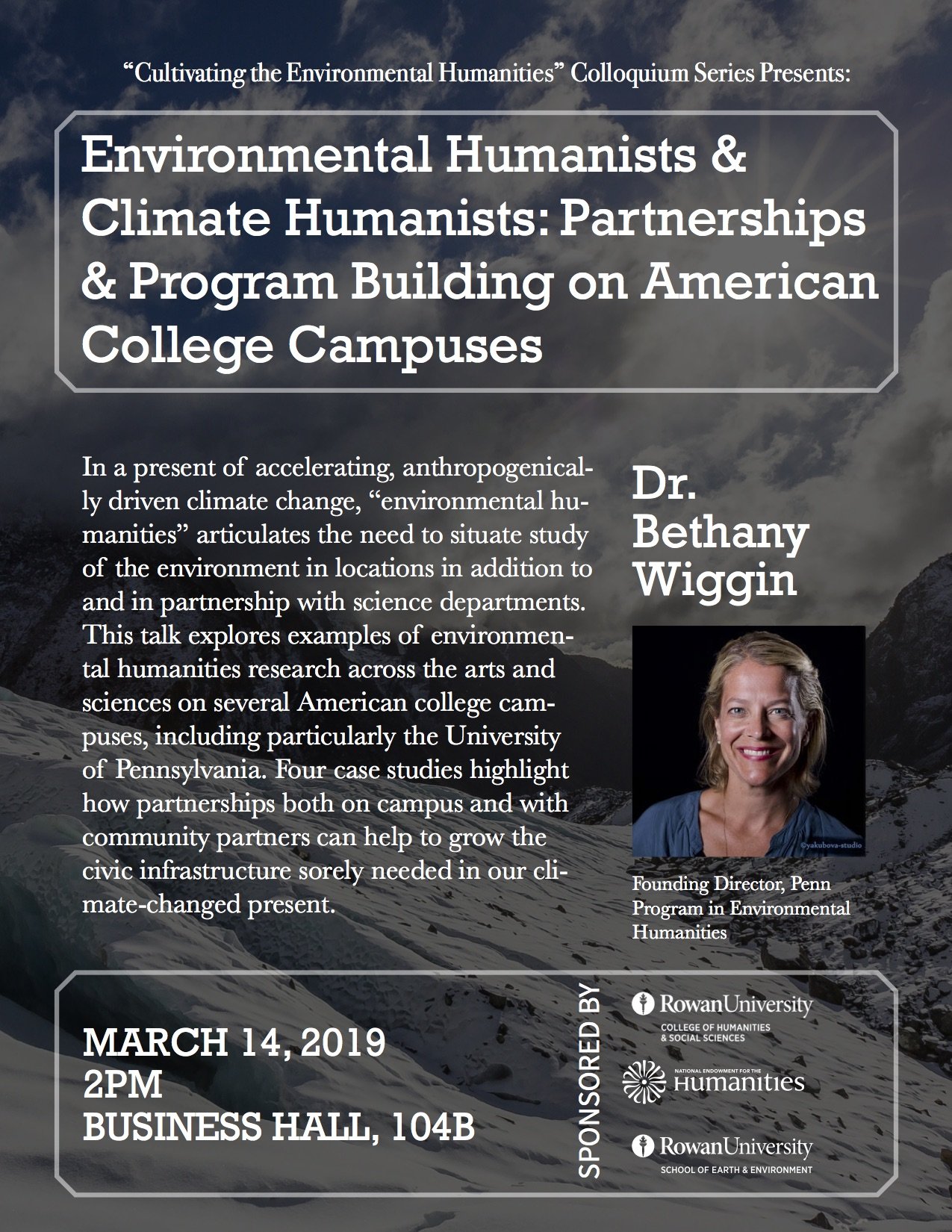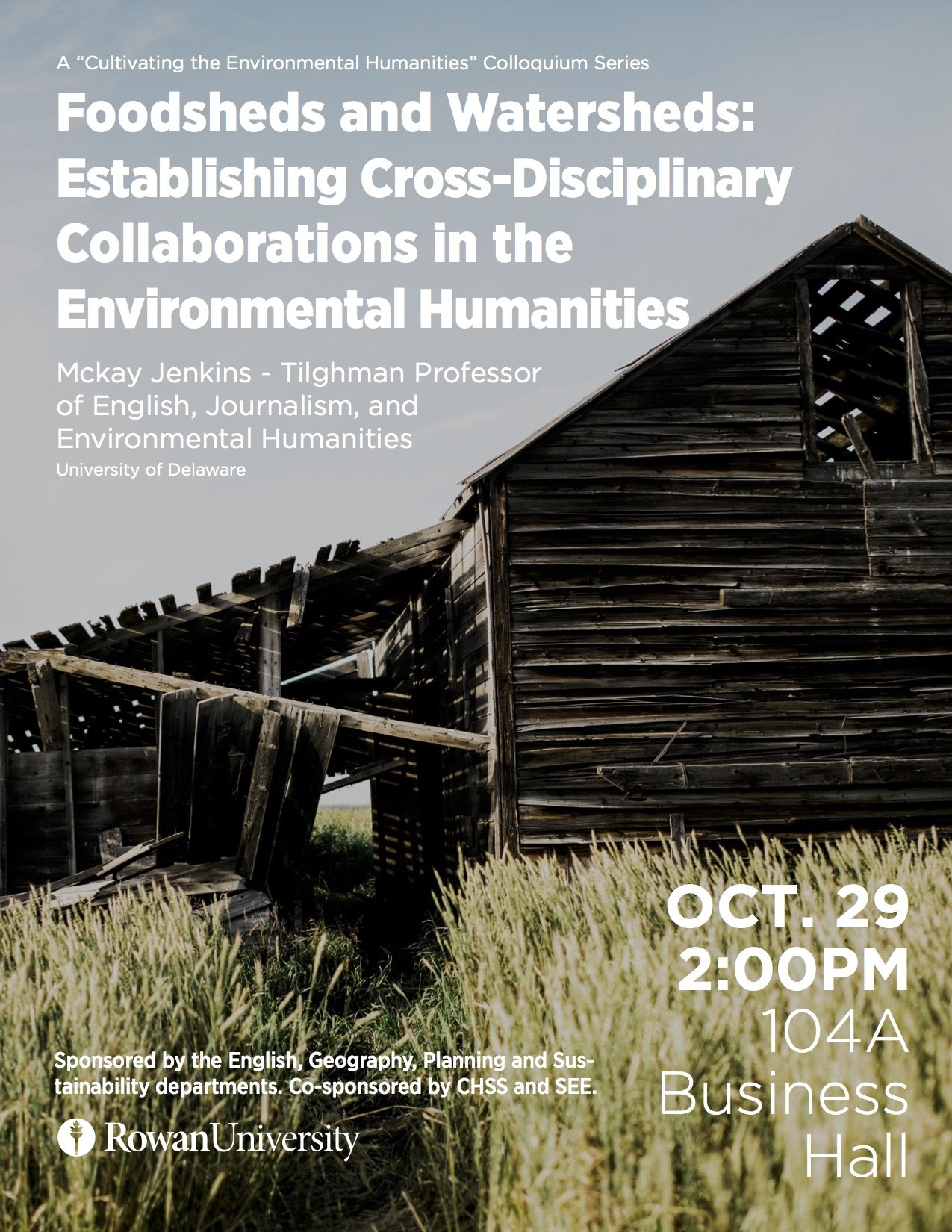Speaker Series
Speaker Series
Environmental Humanities Speaker Series
Spring 2020
Our fourth and final Environmental Humanities Speaker Series event, hosted in conjunction with the Rowan Center for Responsible Leadership, was April 22, 2020. Our guest was Dr. Brooke Stanley, Assistant Professor of English at the University of Delaware. Dr. Stanley’s talk, called "Abalone and Empty Bellies: Narratives of Hunger in the Environmental Humanities” examined a number of fascinating sustainability questions through the lens of the environmental humanities. More info about the talk and Dr. Stanley appears below.
About the talk: How do we understand relationships between globalization and environmental crisis? How can we narrate such large phenomena while attending to their unevenness? What might be the role of fiction in this process? This talk approaches these questions through The Whale Caller, a 2005 South African novel by Zakes Mda. I argue that Mda narrates the nexus of globalization and environmental crisis by turning to hunger and eating. In The Whale Caller, concerns about endangered species are embedded with an attention to unequal food access. As I explore through Mda’s depiction of South Africa’s abalone industry and its foodie restaurant culture, Mda narrates global systems through their local manifestations. In this way he emphasizes how global environmental and economic dynamics impact marginal individuals, at the level of the hungry belly.
About Dr. Stanley: Brooke Stanley (they/them) is an Assistant Professor of English at the University of Delaware. They work in the environmental humanities, postcolonial studies, and food studies, with a focus on twentieth-century and contemporary fiction from the global South. Their current book project explores the politics of food, globalization, and environment in contemporary novels from South Africa and South Asia.
More info about the talk is available here: https://rowan.campuslabs.com/engage/event/5697642
Fall 2019
Our third Environmental Humanities Speaker Series event, hosted in conjunction with the new Rowan Center for Responsible Leadership, was September 17, 2019. Our guest was Carla J.S. Messenger, Director of Native American Heritage Programs. Ms. Messenger shared a talk, followed by audience discussion, called "America's Original People -- Keepers of the Land and Water". The talk focused on the following:
"When the worlds of America’s first people and Eurocentric newcomers collided, their deeply-contrasting beliefs and behaviors inevitably led to conflict that drove Natives from their homelands and greatly reduced their numbers. Fueled by self-interest and justified by misconceptions and myths embedded in America’s founding documents, the divisive racialized emotions of the dominant white culture led to environmental racism that continues to seriously impact Native Americans everywhere in the form of environmental injustice. Aggravated and accelerated by climate change and the expanding carbon infrastructure, the threats to the land and water Natives have always fought to protect are now mainstream issues impacting all of us. The ongoing resistance of the “protectors” to such man-made catastrophes just might offer a roadmap to ending environmental injustice and a guide to surviving climate change."
See the link above for more information about Ms. Messinger as well as the event flyer.
Spring 2019
Our second Environmental Humanities Speaker Series event was March 14, 2019. Our guest was Dr. Bethany Wiggin, Founding Director of the University of Pennsylvania Program in Environmental Humanities and Associate Professor of German. Dr. Wiggin discussed her experiences with developing scholarly, curricular, and community relationships between the Humanities and sciences around critical environmental concern. Her talk, followed by audience discussion, was "Environmental Humanists & Climate Humanists: Partnerships & Program Building on American College Campuses". The flyer for the event as well as additional information about Dr. Wiggin appears further down the page. A video recording of the event appears below.

Dr. Wiggin describes the talk as follows: "In a present of accelerating, anthropogenically driven climate change, 'Environmental Humanities' articulates the need to situate the study of environment within specific locations, in partnership with science departments. This talk explores examples of environmental humanities research across the arts and sciences on several American college campuses, including the University of Pennsylvania. Four case studies highlight how partnerships both on campus and with communities can help grow the civic and collaborative infrastructure sorely needed in our climate-changed present."
Dr. Wiggin is the author of numerous research publications. Dr. Wiggin’s research connects with audiences beyond the academy as well, and has been featured on PBS Newshour, CBS Evening News, CNN, The Daily Show with Trevor Noah, Vice, Die Tagesschau, The Washington Post, The New York Times, Die Süddeutsche Zeitung, Le Monde, and Science Friday.
Fall 2018
The very first Environmental Humanities Speaker Series event happened on October 29, 2018. Our speaker was Dr. Mckay Jenkins. Dr. Jenkins is Tilghman Professor of English, Journalism, and Environmental Humanities at the University of Delaware. His talk, followed by a panel/audience discussion of NEH Faculty Fellows, was called "Foodsheds and Watersheds: Establishing Cross-Disciplinary Collaborations in the Environmental Humanities". The event ran from 2:00 - 3:15 pm in Business Hall 104A. A video recording of Dr. Jenkins' talk and the audience discussion appears below. The flyer for the event as well as additional information about Dr. Jenkins appears further down the page.

Dr. Jenkins shared his experiences developing innovative and experiential ways to engage students in the Environmental Humanities, including: student watershed field journaling; student volunteer farm work; Susquehanna River canoe trips; and invasive species removal projects — all happening outside the classroom.
Dr. Jenkins is an English and Journalism professor at the University of Delaware, specializing in environmental studies and the history, journalism, and literature of race relations and social justice. The Cornelius Tilghman Professor of English, Journalism, and Environmental Humanities, he has been writing about people and the natural world for 25 years. Jenkins is the author of the book Food Fight: GMOs and the Future of the American Diet (Avery, January, 2017), which examines the contentious national debate over the safety, politics, and environmental implications of genetic engineering and industrial food. Jenkins is also the author of ContamiNation (Avery, 2016 - previously published as What's Gotten Into Us: Staying Healthy in a Toxic World (Random House, 2011), which chronicles his investigation into the myriad synthetic chemicals we encounter in our daily lives, and the growing body of evidence about the harm these chemicals do to our bodies and the environment. He is also the co-author (with E.G. Vallianatos) of Poison Spring: The Secret History of Pollution and the EPA (Bloomsbury, 2014) that Booklist (in a starred review) called "a jaw-dropping expose" and "a resounding call for genuine and sustained environmental responsibility."